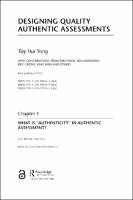Chapter 1 What is "authenticity" in AA?
Proposal review
Abstract
This book examines the principles and practice of authentic assessment. It seeks to answer the following questions. What is authentic assessment? How is authentic assessment different from 'performance assessment' or 'alternative assessment'? How can authentic assessment support learner-centred education, especially when a performance-oriented culture favours pen-and-paper examinations? The book is structured into two major parts. The first, 'Principles of authentic assessment design', provides readers with a conceptual explanation of authenticity; the principles for designing quality authentic assessments for valid evidence of student learning; and guidance about how to develop quality rubrics to structure assessment tasks. The second part of the book, 'Theory into practice' provides examples developed by teachers to demonstrate an understanding of authentic assessment. The subject areas covered include humanities, languages, mathematics, sciences, character and citizenship. Two case studies are discussed to demonstrate how authentic assessment can be used to comprehensively address key learning objectives in a variety of curriculum contexts. This book provides practitioners with concrete examples on how to develop authentic assessment to suit their context and also enhance their students’ learning. The book will also enable teachers to face assessment challenges present in our changing world.
Keywords
Authentic Assessments; Designing; Quality; Learner-Centred Education; Performance CultureDOI
10.4324/9781315179131-3ISBN
9781138896505, 9781138896529, 9781315179131Publisher
Taylor & FrancisPublisher website
https://taylorandfrancis.com/Publication date and place
2018Imprint
RoutledgeClassification
Education


 Download
Download